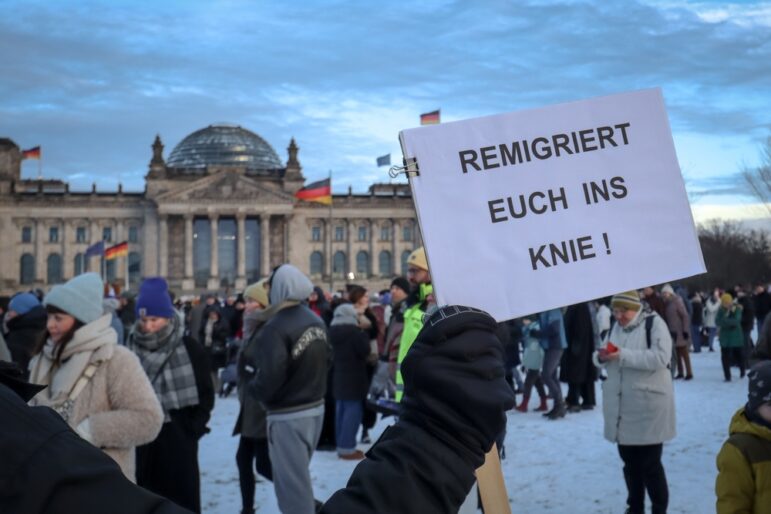At a pretty lake not far from Potsdam — a picturesque city of Prussian palaces 20 miles southwest of Berlin — a breathless runner enters a neo-Baroque villa built in the Weimar era and tries to order a cup of coffee.
The runner — actually an undercover reporter working with investigative journalism newsroom CORRECTIV — has deliberately gatecrashed a gathering in the historic Landhaus Adlon hotel.
“There’s so much adrenaline that you seem calm, but you’re in a high-alert state.” — CORRECTIV’S undercover reporterIt’s late November 2023, and the reporter has, not by chance, found their way into this secret meeting between high-ranking members of the German far-right party, AfD (derived from an abbreviation of “Alternative for Germany”), prominent far-right extremists, and nationalist student fraternities. Attendees also included doctors, lawyers, and entrepreneurs, as well as two members of Germany’s center-right Christian Democratic Union (CDU) Party. At this gathering, a “master plan” to expel millions of people from Germany — including German citizens — would be laid bare.
When CORRECTIV learned about the upcoming event from their sources, the reporter booked two nights at the Landhaus Adlon, where they would hang around wearing their disguise of — as they put it — “stupid-looking glasses” and “dyed hair.”
On the morning of the conference, the undercover reporter had their cover story down: They were going for a run, and knew exactly what they wanted after that run — a coffee. Dressed in jogging clothes and headphones, they announced this to anyone at the hotel who would listen and left for their run. Forty minutes later they reentered the hotel as its special guests began to trickle in. “But where can I get a cup of coffee?” they asked insistently — not letting on that their heart was in their mouth.
“There’s so much adrenaline that you seem calm, but you’re in a high-alert state,” the reporter recounts, speaking anonymously to GIJN to protect their safety. “Because really, your brain is doing something else, and you’re like a cyborg. I had fear, I had joy, I had high tension, I had hyperfocus.”
Having diverted suspicion, the reporter came across a table of letters — addressed to those taking part in the event — and surreptitiously filmed them with a phone. Meanwhile, colleagues were taking photographs with a telescopic lens from a rented sauna ship docked a stone’s throw away from the hotel garden, and collaborators from Greenpeace had parked two cars at the front and used dashboard cameras to monitor who was entering the hotel. Together, their findings formed the cornerstone of an exposé that has sent shockwaves through Germany.
“I was quite sure that they wouldn’t kill me,” the reporter says, speaking about the risk of being exposed. “The worst thing that could happen were some heavy punches.”
The reporter also spoke to several AfD members at the hotel, whose statements the journalists were able to confirm through other sources. (CORRECTIV shared some behind-the-scenes details about the investigation here.)
Six weeks of fastidious fact-checking later, the investigation has prompted mass protests across the country and has dominated headlines in the German press. Among the voices of discontent and fury are those calling to ban the party. According to Reuters, support for the party has reached a six-month low.
‘The Masks Have Fallen’
“The uncovering of this meeting on hateful deportation fantasies… has been an eye-opener for many people,” says Paul Eschenhagen, spokesperson for the German Federation of Journalists (DJV). “Journalism can hardly function better as a tool to enlighten the public.”
Indeed, the exposé has struck a chord nationally in a vital election year, as the far right gains favor across Europe. In Germany, the specters raised are especially gruesome.
“The masks had fallen. Now, many understand what would happen if the guests from this hotel ever gained political power in Germany.” — CORRECTIV investigative reporter Marcus Bensmann“In Germany, you have two groups: One is the people with a migration background. The other is people with a Nazi background,” says CORRECTIV journalist Jean Peters, who headed up the investigation. “So it triggers an immediate urge for a reaction.”
For Marcus Bensmann, a key reporter in the investigation, what was most astonishing about the revelations was the “determination and self-confidence” with which “high-ranking AfD members with a direct line to the AfD national board, lawyers, entrepreneurs, and right-wing extremists, discussed the expulsion of millions of people from Germany. The theses on this were known, but in this hotel… it became a plan,” he tells GIJN.
“That was exactly what moved people. The masks had fallen. Now, many understand what would happen if the guests from this hotel ever gained political power in Germany,” he says.
Bensmann joined the nonprofit investigative news outlet in 2014, and has zeroed in on the AfD since 2016. That was three years after the party was formed in opposition to the European Union’s bailout program. Polling second nationwide, AfD has come to play an increasingly strident role as Germany’s far-right anti-immigration party with radical factions.
Its rising popularity is a particularly disconcerting development in this election year. Many inside the country have called for the party to be banned and decried its antics as unconstitutional. With elections on the horizon for 2024 — both on a European and a German state level — CORRECTIV resolved in the summer of 2023 to look into the strategies the AfD and right-wing parties in Europe were planning to employ.
“For us, the leak is not the beginning of the investigation, but the result. We formulate the question we want to investigate and cast the net,” says Bensmann, explaining how the team learned about the secret meeting.
“One important thing you shouldn’t forget: People don’t care about the name written under an article. No one knows who wrote the article, no one cares.” — CORRECTIV journalist Jean PetersBensmann contributed years of experience building and evaluating a network of sources on the AfD. His extensive experience has allowed him insight when searching for far-right sources. “If you want to write about hell, you have to talk to devils, because the angels only know about hell from hearsay,” he advises. “You have to deal with people whose opinions you don’t share and whose statements you consider to be bad. But when you are investigating such parties, you have to take one principle to heart: you don’t want to convert or condemn your interlocutor, you want to win him over as a source.”
That salient advice comes with a part two: “The conversation with the source is often like a dance, but you have to keep the lead or you’ll have to end it.”
When it comes to the cultivation of sources, Peters recommends letting them come to you. “This source came to me because of who I am. Because they trusted me to follow up on it, because of the topic, not my career. So don’t hide.”
“I think many journalists try to seem neutral, thinking it would seem professional. Truth is always truth. This cannot be beaten by any ideology. My point is: you can have a very clear position and at the same time do proper journalistic work, check your facts, and give the context. That’s just the crafting work anyone can learn at journalism school. But it’s the personality that’s the thing that opens doors,” he says.

A protester holds a sign with a pointed retort to revealed deportation plans at a late 2024 demonstration against right-wing extremism in front of the Reichstag building in Berlin, Germany. Image: Shutterstock
Where Collaboration is Key
CORRECTIV’s reporters are keen to stress that it was the collaborative spirit of the investigation that proved integral to their success. That included working with nonprofit Greenpeace, which shared investigative work with them and had no qualms with playing a supporting — as opposed to starring — role.
Peters says journalists have a lot to learn from nonprofits, where research isn’t so easily obstructed by ego or an unwillingness to share information.
“One important thing you shouldn’t forget: People don’t care about the name written under an article. No one knows who wrote the article, no one cares. Except some Nazis who want to kill you, and some colleagues who are envious,” says Peters.
“Since the revelations about the ‘secret plan against Germany,’ CORRECTIV has been bombarded with hate and threats,” — Paul Eschenhagen from the DJV“We work together collaboratively and with high respect for the respective skills of each individual in our team,” says Bensmann, discussing what has made CORRECTIV successful. “We try out new approaches.”
Indeed, the investigative team did boast a curious and, ultimately, well-selected mix of skill sets. It brought together the deep and fastidious research acumen of the team and the leadership of innovative journalist Jeans Peters, whose out-of-the-box style has led to a diverse career spanning political science, performance and media art, professional clowning, arts journalism, and playwriting.
Peters describes himself as “something of an outsider” in the journalism world — he’s been a key player in major investigations before this one, but cut his journalistic teeth in the arts world. CORRECTIV took him on 18 months ago, being “bold enough,” says Peters, “to invite someone who is covering performance and media art, because they also have other tools, thoughts, and ways to rethink journalism.”
One product of that decision was an accompanying play Peters wrote that was staged right after CORRECTIV pressed publish on their AfD investigation. The one-hour piece, that has been put on, free of charge, by theaters across the country, offers the public an immersive way into the information that they might otherwise only scan and quickly scroll past on a screen.
The popularity of the play, and the cooperation of theaters across Germany, has been heartening to Peters, who sees the dramatic world pitching in just as investigative journalism collaborations on right-wing extremism are blossoming.
“What happens now is both unique in the journalism scene, and it’s unique in the theater scene,” says Peters. “The contrary to fascism is love. So if people don’t want fascism, they go for love, and for human solidarity,” he says. “That’s a beautiful outcome.”
‘Without Freedom of Press, There Is No Democracy’
If love is in the air, so is hate.
“The AfD and its supporters are showing what they think of press freedom. Since the revelations about the ‘Secret Plan Against Germany,’ CORRECTIV has been bombarded with hate and threats,” explains Eschenhagen of the German Journalism Federation. For the team at CORRECTIV, those threats, however startling, don’t come as much surprise. In 2016, a right-wing extremist murdered the politician and AfD critic Walter Lübcke.
“There’s a lot of hate against the team of CORRECTIV right now. They keep dog-whistling for stochastic terrorism, and it’s painful,” says Peters. “And, in case something happens to me or other colleagues, the bloodline will lead straight up to the head of the party, because they publicized this,” he says.
“But this does not minimize the beauty that lies in the people who are standing behind us, and who are supporting us,” Peters adds.
“Such attempts at intimidation and disguised calls for violence as well as hatred and agitation against journalists have no place in a democratic debate,” says Eschenhagen, calling for solidarity with colleagues at CORRECTIV and all media professionals who are committed to fighting extremism. “Because without democracy there is no freedom of the press — and without freedom of the press there is no democracy.”
 Sarah Karacs is a freelance journalist based in Berlin. She was previously a fellow with the European Journalism Observatory. Her work has been published by CNN, Der Spiegel, the New Statesman, and the South China Morning Post.
Sarah Karacs is a freelance journalist based in Berlin. She was previously a fellow with the European Journalism Observatory. Her work has been published by CNN, Der Spiegel, the New Statesman, and the South China Morning Post.

 2 months ago
45
2 months ago
45

